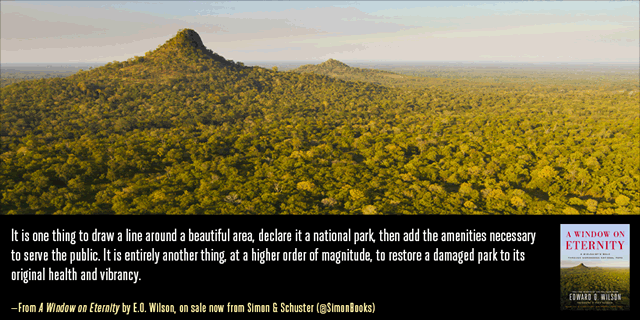

In a recent Wall Street Journal article, E.O. Wilson reminds us, “What we really want is grace. We want understanding. We want to be surrounded by beauty,” as we strive to best support life on earth.
Wall Street Journal
April 18, 2014
By Alexandra Wolfe
The Pulitzer Prize-winning author and biologist Edward O. Wilson has just returned from a month in Mozambique’s Gorongosa National Park (the name means “place of danger” in the local dialect). It is the setting for his latest book, A Window on Eternity, in which he showcases the variety of flora and fauna in the million-acre park to make a case for preserving biodiversity. The park also partly inspired his next big cause: persuading humankind to bring an end to what he calls the Anthropocene Epoch, the age of man.
Back now in his office at Harvard’s Museum of Comparative Zoology, Dr. Wilson, 84, excitedly describes the epic battles he saw at the park. Recognized as the world’s leading ant expert, he talks enthusiastically about viciously stinging Matabele ants marching in unison toward a termite nest for a full-scale assault. “It’s a case of starting a war to gather dead soldiers for food,” he says. “This is war for a purpose.”
Dr. Wilson has become famous (and, at times, controversial) for arguing that there is a biological basis for the behavior of all animals, from ants to humans—a challenge, some think, to the idea of free will. Ants, he says, have survived over other insects for some of the same reasons that humans have dominated other species: their skill in combat and their ability to use resources efficiently. According to him, ants may be better at both. “They’re superb in war,” he says. “Are you listening, Pentagon?” he asks, laughing. “We entomologists would be glad to consult with you for a sufficient fee.”
Still, it’s a limited comparison. “Ants don’t offer any good moral lessons or any lessons about organization,” he says. “All ants that you see are female, and you know, I’m an ardent feminist, but that’s feminism run amok.” Male ants are allowed to be with females only for a short time. “They have only one function in the colony and in life itself, which you don’t want to expatiate in The Wall Street Journal,” he says with a smile.
“I’m turning 85 years old,” he says. “I’m going to tell it like it is,” says E.O. Wilson.
Dr. Wilson has a boy’s enthusiasm, and he revels in discovering new species at Gorongosa. But as the power of science and technology grows exponentially, he worries that people are giving up on preserving nature. Many seem to have resigned themselves to the idea that “we’ve already overrun the world,” he says.
Humans, he says, are just one of some 8 million species on Earth. In calling for the end of the age of man, he doesn’t mean to suggest that humans should be replaced by other species. But he thinks that we should take a cautionary step back and think about how we can cede more of the Earth to nature, to help stabilize the ecosystem. He worries that, if we don’t, the planet will come to look like a spaceship run by technical geniuses. He gestures with imaginary levers while explaining that in this futuristic world, scientists would even have to control the climate with switches. “Humans don’t know what they’re doing. We have no goal,” he says. “You can say we want less war, or we want everybody to be happy, or we want everybody to have long lives and have good health…but what kind of a goal is that? That’s the goal of your family dog,” he says, letting out another guffaw.
What should our goal be? “What we really want is grace,” he says. “We want understanding, we want to be surrounded by beauty, and we want to be surprised constantly by discoveries of something unlike ourselves.” It’s another reason we should leave more of the world to nature, he argues, along with “the shield that biodiversity provides us against catastrophe.” A fully functioning ecosystem, he says, could help protect humans from pathogens and parasites that are kept in check by biodiversity.
He is pleased that about 40 countries around the world have zero or negative population growth, “thanks to the fact that women stop having children once they get a little bit of economic security.” And he is hopeful that science and technology will come up with alternative energy sources to shrink humans’ ecological footprint.


Dr. Wilson is impressed by many of today’s young scientists, but he finds it unfortunate that they are mostly choosing fields like physics, chemistry, molecular biology and neurobiology over biology or ecology. “That’s where the money is, and that’s where they go,” he says.
Over his long career, which began in 1956 as a professor at Harvard and includes 30 books, Dr. Wilson hasn’t shied away from controversy. His 1975 book Sociobiology, now considered a pioneering work in the field, set off a flurry of attacks against him and his ideas. In one now famous episode, a protester poured water over his head during a speech.
“The ’70s proved that universities were not a very good place to have new ideas,” he remembers. “Political correctness ruled.” In Sociobiology, he insisted there was a biological basis for human social behavior. “During the civil rights movement and the rise of resentment against the Vietnam War, the country’s intellectuals and its professors shifted far left. As part of this we adopted a necessary belief…that everything is due to culture and history, and nothing is due to the way that the brain is wired,” he explains.
Other academics believed “that by pointing to the obvious—that we have instincts—I was doing a great disservice, and I was promoting racism,” he adds. The thinking was that “if you could have a genetic basis for your behavior, then somebody could say there could be a genetic basis for differences from one race to the other, and that is what frightened them.” Once scientific research in the 1980s began to include work on how genes affect human behavior, Dr. Wilson says, the criticism let up.
But he has continued to butt heads with other scholars, recently with the biologist and science writer Richard Dawkins, who panned Dr. Wilson’s 2012 book, “The Social Conquest of Earth,” in the British magazine Prospect. In the book, Dr. Wilson challenged the idea of kin selection—the long-held theory that individuals display altruistic, self-sacrificing behavior toward their relatives, with the aim of perpetuating their own genes. He put forth a theory of group selection, a kind of natural selection that acts on all members of a group rather than just related members and ultimately evolves the fitness of the entire group.
Dr. Wilson hopes that his next book, The Meaning of Human Existence, coming out this fall, will be just as inflammatory. After all, he says, science proceeds only when people are “willing to stick their necks out.” He says, “There’s nothing more satisfying than the slaughter of an old theory, provided you can replace it.” In his new book, he says that he will talk about “how to regard humanity shorn of superstition about humanity.”
“I’m not messing around,” he says. “I realize this will bother some philosophers who don’t have much left to do but semantics,” he adds, chuckling. “I’m going to be taking a lot more heat if I’m successful, but I don’t care.”
“Do you want to know why?” he asks with puckish delight. “I have tenure. I’ve retired, and I’m turning 85 years old,” he says. “I’m going to tell it like it is.”

